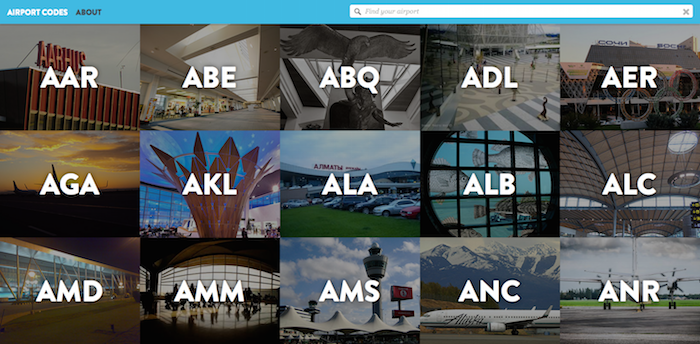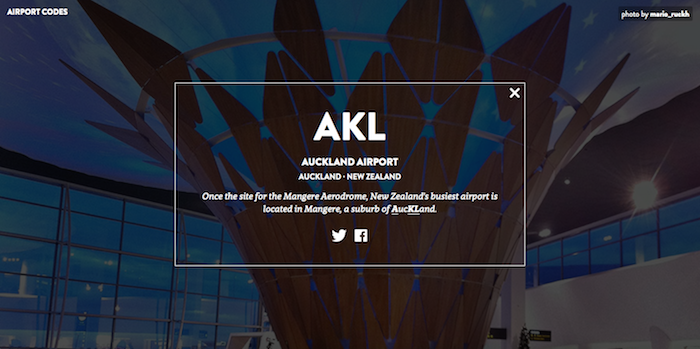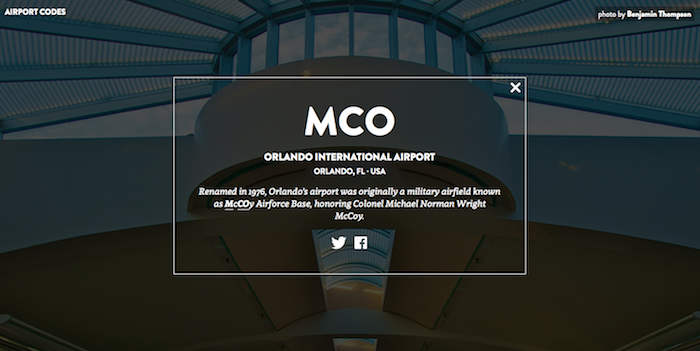I’ve received several messages today from readers pointing out an awesome website — http://airportcod.es/.
Have you ever wondered the origin of airport codes? Well this website lists virtually all major airports, and where their airport codes originated.

Some are of course pretty straightforward. Like AKL is simply named after the city, AucKLand.

But what about Orlando’s Airport, MCO? Did you know the airport was originally a military airfield and known as McCoy Air Force Base, which is where the airport code came from?

This is an awesome resource if you’re an airplane geek like me!
Did you find any airport codes which surprised you?
(Tip of the hat to Andreas)





@anon This relates to radio transmitter signals. In the early days of broadcast radio, North America was divided into three geographic zones, each of which carried a regional specific letter. These were used in front of a radio station’s callsign, Canada’s of which, was Y. This explains Ottawa International Airport (YOW) and Vancouver International Airport (YVR).
Toronto in theory, should then have the code YTO, but YTO was already assigned to Toronto’s generic regional code,...
@anon This relates to radio transmitter signals. In the early days of broadcast radio, North America was divided into three geographic zones, each of which carried a regional specific letter. These were used in front of a radio station’s callsign, Canada’s of which, was Y. This explains Ottawa International Airport (YOW) and Vancouver International Airport (YVR).
Toronto in theory, should then have the code YTO, but YTO was already assigned to Toronto’s generic regional code, and so it seems the Canadian’s took YYZ from a regional radio station in Malton, where the airport is located.
The 4-letter ICAO code for Canadian airports starts with CY or CZ. The 3-letter IATA codes therefore start with Y (e.g. YUL for Montreal-Dorval and YYY for Mont-Joli) or Z (e.g. ZBM for Bromont). How that was decided I have no clue but it's definitely simpler to remember than LPFG vs. CDG.
Well there goes my evening, now I have to review all of these! :)
@anon
IDK but the silver lining is that is was the inspiration behind a Rush song.
I once redeemed by phone an award to go to Fukuoka, Japan. Being unfamiliar with the city, the agent who sounded like an elderly lady was clearly embarrassed when trying to correctly pronounce its name or its IATA code...
OGG is Maui, HI. Named after Frank Ogg one of the earliest commercial pilots in Hawaii
Not much logic behinc the IATA airport codes besides the city name and what is available. I find the building of the ICAO airport codes more interesting, tbh.
Since airports are weather reporting stations, I had to memorize hundreds and hundreds of these when getting my meteorology degree. The hourly observations used to roll off 30 wpm teletype machines by region, starting in the northeast and onward across the country. This was known as "FAA Service A." And along the way were the expected comments -- "The weather in Sioux City really SUX!," and so on.
I hoped it would give me more insight about YUL... I'm still not satisfied!
"With a few exceptions, airport codes starting with ‘Y’ designate Canadian airports. The ‘UL’ isn't as clear, but may be due to a nearby radio beacon which has continuously broadcast those letters since before the airport’s establishment in 1941."
RSW (Regional Southwest Int'l) opened as a new airport in 1983, as the Fort MYers market had outgrown Page Field (FMY).
Page Field (FMY) still operates as a GenAv facility.
While I always thought APF was named for its location in nAPles Florida, I've read it was originally civil, but then used by military and was designated "Alternate Page Field" (APF).
This was really cool, although missing my hometown airport (POA - Porto Alegre).
On the same idea, this is also really cool: a site that finds your next destination using the airport codes included in your name:
http://airporting.me/
For me (Francisco), it would be FRA - NCI (Colombia) - SCO (Kazakhstan).
Wow! Awesome site. Ddin't know that before 1930 all airports were two letter codes.
Most airports chose to add an 'X' to make it 3-letters (LAX), but SFO decided to take last letter of their city!
Cool things
I've always been curious about DXB. Of course. Dublin already had the logical code for Dubai.
always wondered why exactly dulles was IAD. cool site!
I liked the idea of using X when you can't find anything to fill the three letter codes
How did canada get stuck with Y__ airpor codes?